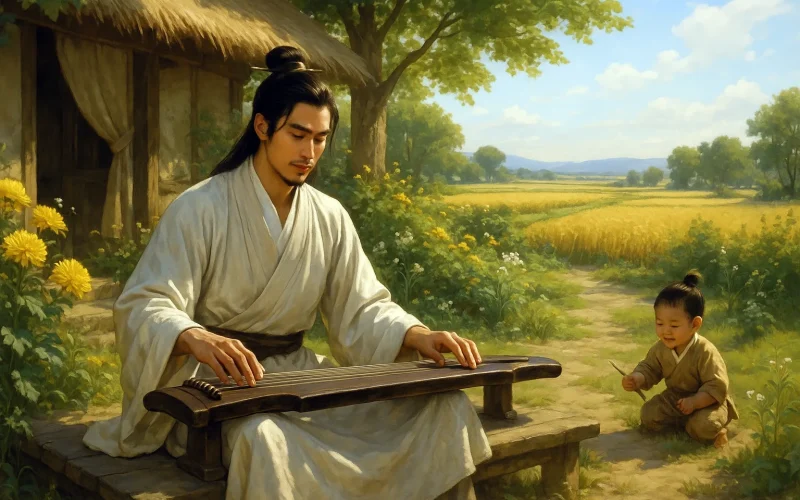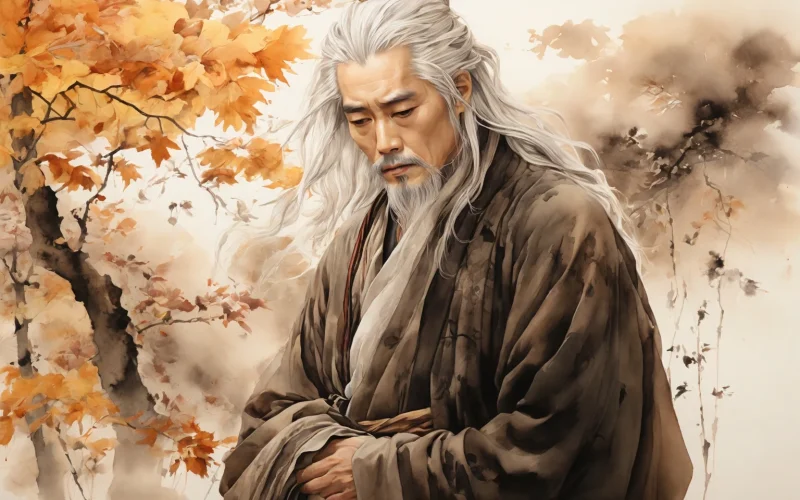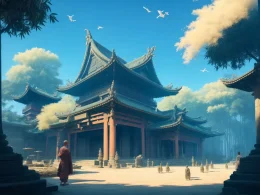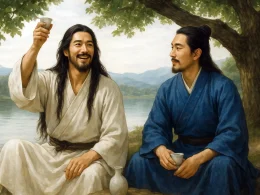The shady trees before my hall
Store coolness against summer heat.
The south wind comes at season’s call,
My lapel welcomes its breath sweet.
Not sociable even at leisure,
I rise to play my lute or read.
Eating my garden greens with pleasure,
I’ve stored up a year’s grain and seed.
I won’t lead a life beyond measure.
Why should I have more than I need?
I pound sorghum to make home brew;
And drink until in wine I’m drowned.
Beside me plays my son of two,
Making inarticulate sound.
Such trifling things afford delight;
I forget the vainglorious age.
Gazing from afar on clouds white,
I seem to see the ancient sage.
Original Poem
「和郭主簿二首 · 其一」
陶渊明
蔼蔼堂前林,中夏贮清阴。
凯风因时来,回飙开我襟。
息交游闲业,卧起弄书琴。
园蔬有余滋,旧谷犹储今。
营己良有极,过足非所钦。
舂秫作美酒,酒熟吾自斟。
弱子戏我侧,学语未成音。
此事真复乐,聊用忘华簪。
遥遥望白云,怀古一何深!
Interpretation
Composed in 408 CE when Tao Yuanming was 44 years old, two years after retiring to countryside seclusion. This midsummer portrait of rural life expresses his contentment with simple living and profound joy found in nature and family, embodying his philosophical acceptance of life's natural flow.
First Couplet: "蔼蔼堂前林,中夏贮清阴。"
Ǎi ǎi táng qián lín, zhōng xià zhù qīng yīn.
Lush woods before my hall store summer's cooling shade.
The poem opens with tranquil natural imagery, depicting the comfort and serenity of rural life in peak summer.
Second Couplet: "凯风因时来,回飙开我襟。"
Kǎi fēng yīn shí lái, huí biāo kāi wǒ jīn.
Southern breezes timely come, billowing through my lapels.
The "auspicious wind" symbolizes harmony with nature's rhythms, while the physical sensation of wind playing with clothing embodies complete ease.
Third Couplet: "息交游闲业,卧起弄书琴。"
Xī jiāo yóu xián yè, wò qǐ nòng shū qín.
Ceasing social ties, at leisure I rise to books and lute.
This reveals the poet's withdrawal from worldly affairs to cultivate spiritual pleasures, showcasing noble intellectual pursuits.
Fourth Couplet: "园蔬有余滋,旧谷犹储今。"
Yuán shū yǒu yú zī, jiù gǔ yóu chǔ jīn.
Garden vegetables richly suffice, last year's grain still fills my stores.
Material sufficiency reflects the philosophy of "contentment brings happiness" in simple living.
Fifth Couplet: "营己良有极,过足非所钦。"
Yíng jǐ liáng yǒu jí, guò zú fēi suǒ qīn.
Provisioning has proper limits - excess merits no admiration.
This couplet crystallizes Tao's ethos of moderation and rejection of material excess.
Sixth Couplet: "舂秫作美酒,酒熟吾自斟。"
Chōng shú zuò měi jiǔ, jiǔ shú wú zì zhēn.
Pounding glutinous rice for fine wine, matured, I pour my own cup.
The self-sufficient pleasure of homemade wine represents the joy found in simple rituals.
Seventh Couplet: "弱子戏我侧,学语未成音。"
Ruò zǐ xì wǒ cè, xué yǔ wèi chéng yīn.
My young child plays nearby, babbling half-formed words.
Family warmth permeates through the child's innocent presence and developing speech.
Eighth Couplet: "此事真复乐,聊用忘华簪。"
Cǐ shì zhēn fù lè, liáo yòng wàng huá zān.
Such authentic joys make me forget official headdresses.
The "ornamental hairpin" symbolizes political ambition, now willingly forgotten.
Ninth Couplet: "遥遥望白云,怀古一何深!"
Yáo yáo wàng bái yún, huái gǔ yī hé shēn!
Gazing distantly at white clouds - how deeply they stir ancient thoughts!
The conclusion expands perspective to cosmic and historical dimensions, blending personal experience with eternal contemplation.
Holistic Appreciation
The poem unfolds layer by layer - from natural surroundings to spiritual pursuits, material sufficiency to family joy, culminating in philosophical reflection. Without dramatic emotion, it radiates profound contentment. Tao's description of post-official life reveals complete liberation of spirit and unwillingness to return to politics. The final cloud-gazing couplet places personal experience within historical and cosmic context, adding philosophical depth.
Artistic Merits
- Unadorned eloquence: Simple language carries profound meaning
- Integrated structure: Seamless progression from concrete to abstract
- Philosophical naturalism: Blends physical sensation with metaphysical insight
- Emotional restraint: Conveys deep joy through understated details
Insights
This poem teaches that true happiness springs from inner peace rather than external success. Like Tao Yuanming, we might find fulfillment by embracing simplicity, moderating desires, and appreciating life's basic pleasures - family, nature, and mindful living. More than rural poetry, it whispers a philosophy of existence: reject vanity, dwell in the present, and discover abundance in apparent simplicity. The work remains remarkably relevant for modern seekers of meaning beyond material accumulation.
Poem translator
Xu Yuanchong (许渊冲)
About the poet

Tao Yuanming(陶渊明), 365 – 427 CE, was a poet, literary figure, fu writer, and essayist active during the late Eastern Jin and early Liu Song dynasties. Born in Chaisang (near present-day Jiujiang, Jiangxi Province), he pioneered a new genre of pastoral-themed literature, expressing profound philosophical insights through simple language. His poetic style became an enduring aesthetic standard in classical Chinese poetry.











